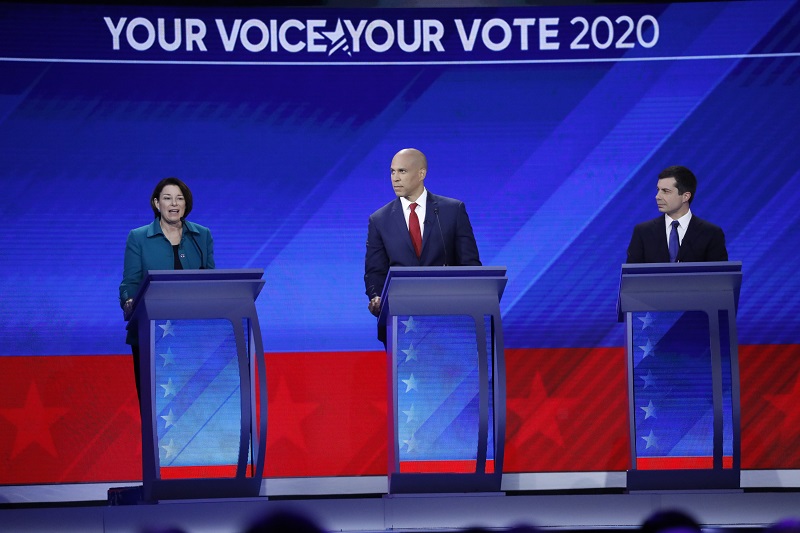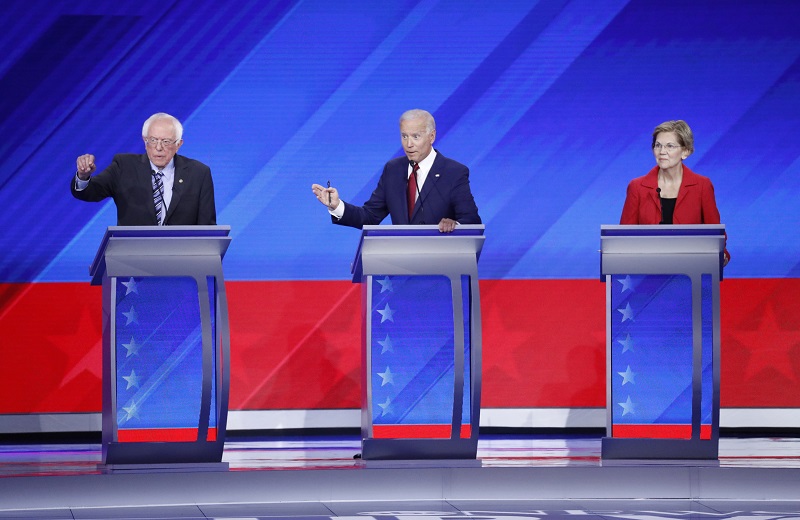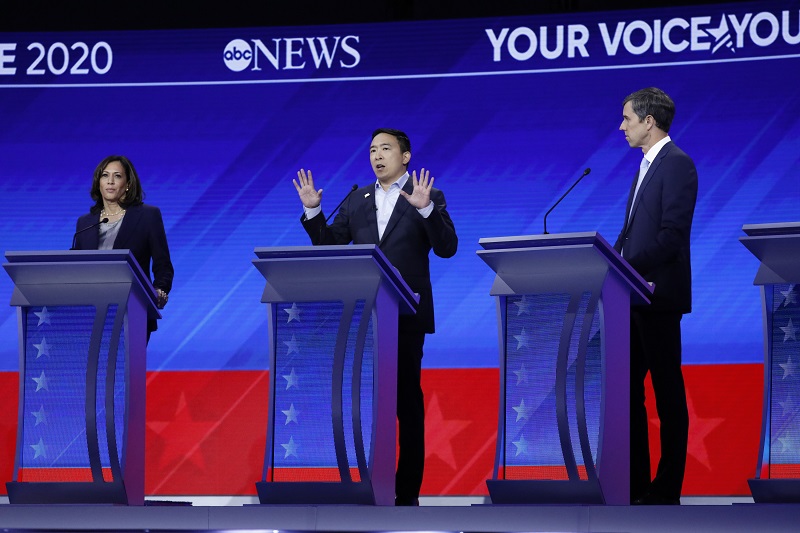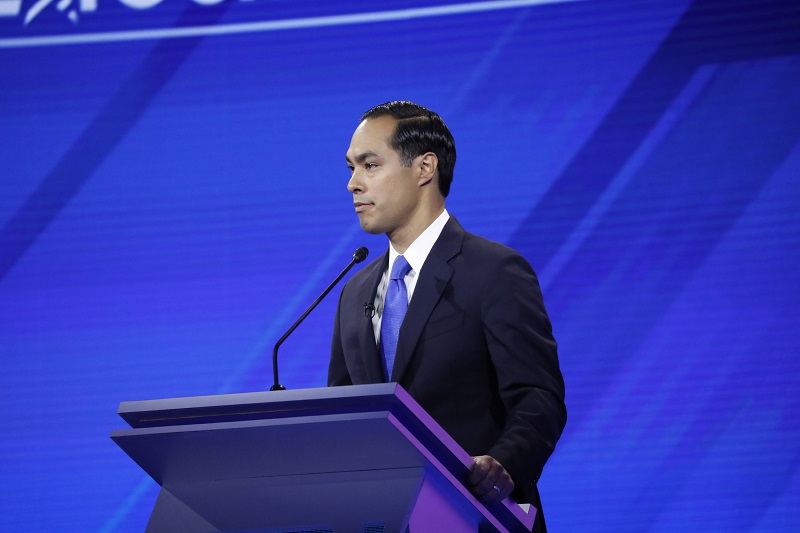Last night, ten of the leading candidates for the Democratic nomination gathered at Texas Southern University — the alma mater of the late, great (and closeted) Barbara Jordan — to participate in the cycle’s third debate. There have been a lot of changes in the race since last time the candidates gathered. Five candidates — Mike Gravel, John Hickenlooper, Jay Inslee, Seth Moulton and Kirsten Gillibrand — have ended their presidential campaigns. The loss of Gillibrand and Inslee were particularly felt during last night’s debate, as their signature issues — women’s rights and climate change, respectively — didn’t get the attention they might have if those candidates had been on the stage.
Also, as the Democratic National Committee announced back in May, the third debate came with increased restrictions on participation, based on fundraising and polling. Those restrictions meant that seven candidates who participated in the second series of debates weren’t able to participate in this one, much to their consternation. Those candidates can still earn a spot in the DNC’s fourth debate, though, by meeting polling and fundraising thresholds by October 1; in fact, billionaire philanthropist Tom Steyer already has.
The Demand for Civility
I do my best, after the debates conclude, to not watch any of the talk from the political pundits that follows; if I’m going to recap the debate for Autostraddle, I think it’s incumbent that I share my own perspective and not just recycle something that I’ve heard from a pundit. But, as it happens, last night, I left the remote on the other side of the room, so I couldn’t turn off the television right away… which meant I got an earful of Rahm Emanuel ranting about how Julián Castro has “disqualified himself” by being “mean and vindictive” to Joe Biden. The former Chicago mayor was referencing an exchange between the two candidates where Castro accused Biden of forgetting what he had said earlier on health care. In a critique that would be echoed across cable news and social media, Emanuel essentially accused Castro of being ageist.
Julián Castro tangles with Joe Biden on health care. Biden: "They do not have to buy in." Castro: "You just said two minutes ago that they would have to buy in … Are you forgetting what you said two minutes ago?" https://t.co/FLm2FchztQ #DemDebate pic.twitter.com/jnmRT5s0pY
— World News Tonight (@ABCWorldNews) September 13, 2019
Putting aside the fact that I don’t think that the man who hid the truth about the murder of Laquan McDonald for a year should be lecturing anybody else on what’s “mean and vindictive,” let’s examine this critique for a moment.
First, on the substance: there are two provisions of Biden’s “Medicare for Choice” plan which were being conflated. Biden’s health care plan does have a buy-in for people who’ve lost their employer-based health care but his plan also includes a provision for automatic enrollment to a Medicare-like system for people who can’t afford it. Castro criticized the buy-in portion while ignoring the automatic enrollment, while Biden defended the automatic enrollment portion while disregarding his plan’s buy-in. They were both right; they were both wrong.
But no one, seemingly, cares about who was right or wrong on the substance because they’re more worried about the candidates being nice to each other. Far too many people criticized Castro after last night’s debate and, for me, at least, it begs the question: in these uncivil times, why are we so concerned with civility? And, moreover, how do our biases effect who we demand civility of?
During the first Democratic debate, nearly every answer Rep. Eric Swalwell gave was a direct attack on Biden’s age. He was far more direct in his confrontation of Biden and his age — urging him to “pass the torch” — than Castro and no one ever bothered to criticize him for it. Sure, we’re three months closer to the start of voting than we were back in June but, still, demanding civility from the lone Latinx candidate in the field while excusing others smacks of bias. And, anyone who’s paid even a little bit of attention to politics since 2016 knows that when the time comes for the Democratic nominee — whoever they are — to debate the incumbent president, that nominee will be lectured about civility, even though pundits will never demand or expect that of Donald Trump.
Highs & Lows:

+ Amy Klobuchar – Senator from Minnesota
High: I thought Klobuchar had her strongest debate performance of her campaign last night, aided by sharing the debate stage with the race’s frontrunners and not sharing the stage with other Midwesterners who share her rhetoric. Rather than coming at Biden from his left like most other candidates in the field, Klobuchar positioned herself well as the moderate alternative to him, should his missteps doom his candidacy. Her best moments came at the start of the debate — when she leveled a particularly stinging in her criticism of Bernie Sanders’ Medicare for All plan — and at the end, when she talked about her work to secure 48-hour hospital stays for new mothers. And bonus: she quoted Barbara Jordan!
Low: Whenever you talk about Kamala Harris, someone, somewhere will mention her time as a prosecutor, but when you talk about Amy Klobuchar, her record as a prosecutor — which is as bad, if not worse, than Harris’ — is never brought up. It was nice to hear it finally talked about last night but I found Klobuchar’s answer disappointing.
+ Cory Booker – Senator from New Jersey
High: Booker delivered another solid performance in the third debate. I thought his direct charge on criminal justice reform, specifically calling on his fellow Democrats to grant clemency to the 17,000 people unjustly incarcerated in America, was a strong moment. I think he pivoted really well off an awkwardly worded question from Jorge Ramos about his veganism and other people eating less meat.
Booker said, “The factory farming going on that’s assaulting this corporate consolidation of the agricultural industry, one of the reasons why I have a bill to put a moratorium on this kind of corporate consolidation is because this factory farming is destroying and hurting our environment.”
Low: While Booker’s performance was good, I think he needed a great performance to really gain traction. Booker seemed more willing to jab at his opponents from the post-debate spin room than on the debate stage.
+ Pete Buttigieg – Mayor of South Bend, Indiana
High: As a queer woman, it was hard to listen to Pete Buttigieg recount his decision to come out — while serving in the military under Don’t Ask, Don’t Tell and while serving in public office in Mike Pence’s Indiana — and not be moved by it. I was reminded not to take for granted the power of having an out gay man among the contenders for the Democratic nomination. Buttigieg might become the nominee or the president and that’d be amazing but even if fails in his pursuit, I hope he inspires more LGBT people to claim their rightful place in the political square.
Buttigieg’s other strong moment was on the issue of China when he took on the president directly, saying, “you know, when I first got into this race, I remember President Trump scoffed and said he’d like to see me making a deal with Xi Jinping. I’d like to see him making a deal with Xi Jinping. Is it just me, or was that supposed to happen in, like, April?”
Low: Following the exchange between Castro and Biden, Buttigieg was one of the candidates on the stage calling for more civility. He said, “this reminds everybody of what they cannot stand about Washington, scoring points against each other, poking at each other…” Castro rightly reminded Buttigieg that that’s what debates and a primary are for.
Also? That’s not what I cannot stand about Washington. I cannot stand a Washington that locks kids in cages, blocks access to our shores by refugees fleeing persecution or the fallout from a natural disaster. I cannot stand a Washington that does nothing while the President disregards the law with impunity. This? Two candidates fighting over a Washington that provides truly universal coverage? That’s a Washington I can get behind.

+ Bernie Sanders – Senator from Vermont
High: Bernie Sanders excelled last night where he has excelled throughout these debates: whenever he is challenged on Medicare For All, he delivers a forceful response. He delivered a strong rebuttal to Biden’s charge about the cost for Medicare for All not adding up, echoing studies who have called the plan “the most cost-effective approach to providing health care to every man, woman, and child in this country.” Every opportunity he had, he pivoted back to his overall message of being willing to take on the powerful special interests, from those in the health care industry to those in the NRA.
Low: Sanders finished fourth among the candidates with respect to speaking time — behind Biden, Warren and Castro — and, as one of the frontrunners in this race, that’s disappointing… that said, given that Sanders sounded a bit under the weather last night, maybe his team is happy that the debate didn’t overextend their candidate. It seems like Sanders garners a lot of debate attention during the discussion of health care and then stops being a focus of the moderators’ attention after that.
Also? I thought Sanders missed an opportunity on the question about Venezuelan dictator Nicolas Maduro to distinguish the values and vision for his brand of socialism from Maduro’s and others like him. It’s a crucial distinction that needs to be made if Sanders wants to earn the votes from those immigrant communities, in particular.
+ Joe Biden – Former Vice President
High: Joe Biden is at his best when he’s given a chance to be sympathetic and I think the moderators gave him the opportunity to do that with their final question on resilience. There is a great amount of affection for Joe Biden in the Democratic Party and when he talks about his losses — his first wife and his daughter and more recently, his son, Beau — and how he got back into the fight after them, it’s hard not to like him for it.
Low: Listen, I realize my job is to talk about these candidates with some semblance of expertise but I’ve got to be honest: I have no idea what the hell Joe Biden was thinking or saying here and he’s fortunate that Julian Castro was “mean” to him so he doesn’t have to answer for it:
+ Elizabeth Warren – Senator from Massachussetts
High: I don’t think there’s another candidate in the field who does a better job at making the case for their candidacy than Elizabeth Warren. I’m not talking about the substance of her argument, I mean the structure of it: her answers are always straight-forward and clear and she always manages to weave her personal narrative into whatever issue she’s discussing. Also? She seems indefatigable: last night’s debate was nearly three hours long and, unlike other candidates, Warren never seem to fade or falter when the spotlight fell on her.
Low: Though she and Biden ended up leading the field with in speaking time, it definitely seemed like Warren disappeared for long stretches during the debate. If the fourth debate is broken up into two smaller stages — six Democrats per night, perhaps — I wonder how Warren will do.

+ Kamala Harris – Senator from California
High: I think that Kamala Harris came out of the gate stronger than any other candidate on the stage. She went directly after the president, almost goading him into a response. The final line from her opening statement — “And now, President Trump, you can go back to watching Fox News” — felt like a mic drop.
I was particularly impressed with her response on health care, which offered a short synopsis of her plan and then pivoting to all the ways that the current administration is working to undermine “Obamacare” right now.
“Donald Trump’s Department of Justice is trying to get rid of the Affordable Care Act,” Harris pointed out. “Donald Trump’s administration is trying to get rid of the ban that we placed on denying people who have pre-existing conditions coverage. Donald Trump is trying to say that our kids up to the age of 26 can no longer be on our plans.”
Low: Was that first debate win for Harris an anomaly? It’s certainly looking that way because, over these last two debates, she’s been woefully inconsistent. After her forceful attacks on the president to start the debate, she seemed to fall back into a lull, inserting jokes into her answers that didn’t quite land.
+ Andrew Yang – Former Tech Executive
High & Low: Andrew Yang kicked off the debate by offering $1,000 per month for a year to 10 families as a way of promoting his plan for a universal basic income. The stunt probably got his campaign the attention that he wanted — extra e-mails added to their campaign list — but it’s probably illegal. Worse yet, I’m not sure that voters are looking to trade in the Apprentice president for the Publisher’s Clearinghouse president.
Extra Low: I do wish he would stop making Asian jokes. Also? I don’t understand what Yang finds appealing about telling the audience that he’s essentially abandoned his kids for this vanity project.
+ Beto O’Rourke – Former Congressman from Texas’ 16th district
High: One of the lessons you learn early on in politics is that every crisis is an opportunity and, as uncouth as it sounds, Beto O’Rourke has taken the crisis that happened in his backyard — the shooting of Latinx folks in El Paso, Texas — and turned it into an opportunity to reset his campaign and remind people why they liked him so much in that Texas Senate race. It wasn’t just that people really didn’t like Ted Cruz — though we really don’t — it was that Beto showed himself to be a candidate who’d speak truth to power.
Beto’s finest moment came when he admitted, flat out, that he wanted an involuntary government buyback of certain weapons of war. He said, “hell, yes, we’re going to take your AR-15, your AK-47. We’re not going to allow it to be used against our fellow Americans anymore.”
Low: O’Rourke has made guns the central issue of his campaign but I wonder how sustainable that is in a primary that’s really focused on health care and immigration.

+ Julián Castro – Former Secretary of Housing and Urban Development
High: I think Booker, Warren and Castro are the three most consistent debaters in the field but of them only Castro’s shown the willingness to go after his opponents on a regular basis. Beyond that, though, I thought we saw last night one of the things that makes Castro a unique candidate: his ability to see communities that often go unacknowledged by others. He spoke the names Laquan McDonald, Eric Garner, Michael Brown, Pamela Turner, Walter Scott and Sandra Bland. In his answer about China, he acknowledged the Uighurs who are being imprisoned and mistreated there. He does this consistently, without provocation, in every debate and it speaks well of him as a candidate, in my view.
Low: I think the Biden attack was way overblown but, from the looks of things on social media and cable news, it’s going to be an issue. How Castro handles this moment in the spotlight will say more about the future of his campaign than anything that said on the debate stage last night.
Last night, Jorge Ramos prefaced a question to Joe Biden about the Obama administration’s deportation record with this: “Only a few weeks ago, the deadliest massacre of Latinos in modern U.S. history happened in this state, in El Paso. So the fear among Latinos — and you know this — is very real.” And while no one can doubt the fear that’s being felt by Latinos all across the country after El Paso, I do feel obliged to point out, as I did on twitter last night, that Jorge Ramos is wrong. The deadliest massacre of Latinos in modern U.S history happened in Orlando, Florida when Omar Mateen stepped into Pulse Nightclub on June 12, 2016 and killed 49 people, many of whom were Latinx and most of whom were queer. It’s an erasure that feels especially painful in a debate where, aside from Buttigieg’s personal reflection, LGBT issues weren’t brought up at all.
That said, we’ll get two opportunities over the next month to hear from the candidates on LGBT issues: first, One Iowa, The Gazette, The Advocate and GLAAD will host a LGBT Presidential Forum in Cedar Rapids, Iowa on Sept. 20th. Thus far, Biden, Castro, Joe Sestak, Marianne Williamson and Booker have all agreed to attend. GLAAD will live stream the event. Then, on Oct. 10 in Los Angeles, CA, the Human Rights Campaign and UCLA will host a town hall event called “Power of Our Pride” that will be broadcast live on CNN. Thus far, Biden, Buttigieg, Castro, Harris, Klobuchar and Warren have confirmed their attendance.



This is an excellent synopsis — thank you!
Natalie this is BRILLIANT. Thank you, I just learned so much. (I am constantly flabbergasted that we have access to your brain on a regular basis like this. Thank you. Thank you. Thank you.)
This is the only place I’m getting my debate info, and I appreciate the high quality coverage. Thank you!
Jorge Ramos isn’t the only one. I think every report about El Paso that I heard on the radio (no TV news for me) made the same damn mistake. This exacerbated the anger I was already feeling about continuing gun violence, and I just kept shouting “Pulse!” at an inanimate object.
Also, thank you for this excellent recap.
Thank you, again, for excellent coverage. I didn’t get to watch any of this debate and I really appreciate your thoughtful recap.
natalie this is perfect! i did watch the debate but didn’t read any coverage of it besides yours and i feel great about it. you brought up a lot of stuff i agreed with, mentioned a lot of things i didn’t know, and just generally i’m eager for your future election coverage as well!
This is, by far, the best coverage of the debate that I read. Thank you Natalie
Thank you for providing top-notch political coverage and commentary in these difficult times.
What a pointless and worthless debate. Great coverage though, Natalie.
I feel that Elizabeth Warren did exactly what she wanted to do: lay low. She’s rising in the polls, trending among the populace, and getting out to do meet-and-greets face-to-face. The only things she needed to do here was not make any fubs and to avoid taking any major attacks. Let her opponents turn on each other.
Thank you Natalie!!